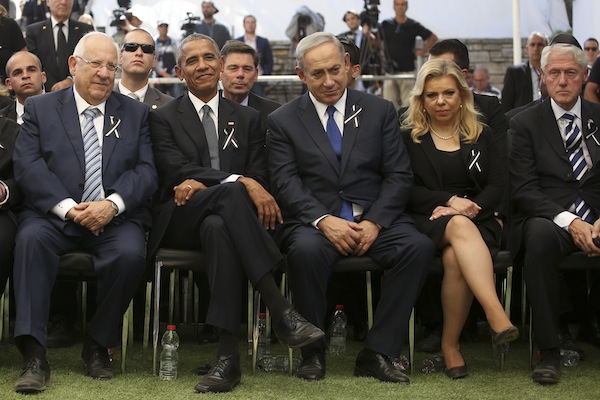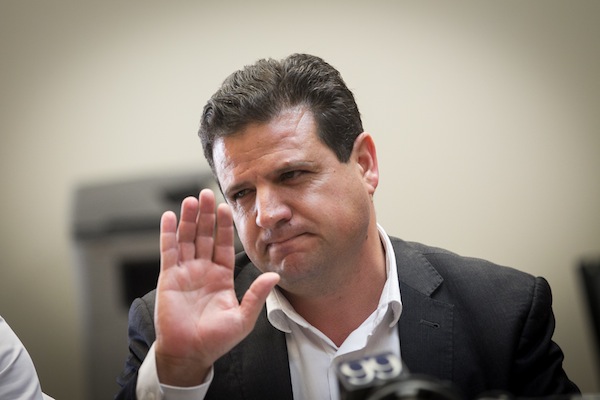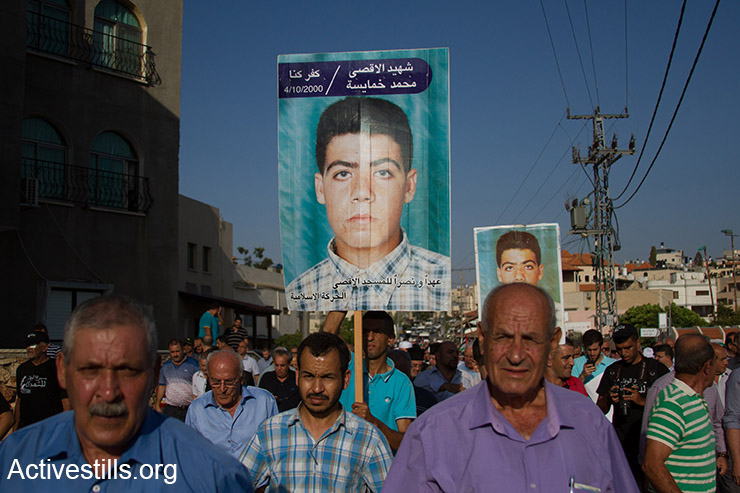By refusing to attend the funeral, leader of the Joint List Odeh was protesting the myth of Shimon Peres, who enjoyed the global brand of peacemaker after Oslo, but walked away when things didn’t exactly work out.

The death of a towering statesman is an occasion for an outpouring of oratory about his or her meaning in the country’s life. Rivers of memory and interpretation flow and converge to form that leader’s mythical legacy in the story of the nation.
Shimon Peres was an elder statesman who evolved late in life, with no small difficulty, into a figure of national consensus. Though the obits sweeping the country contain some critical recollections, there is no controversy over what he is supposed to mean now: Peres, the man of peace, dialogue, optimism.
So when head of the Joint List Ayman Odeh demonstratively stayed away from Peres’ funeral, he kicked through the dams and upset the whole narrative flow.
Why did Odeh do it? Since becoming leader of the unified Arab party prior to the 2015 elections, he has gained a following among progressives in Israel and abroad, inspired by his humanist, universalist values. He has linked the struggle of Arabs in Israel to the struggles of Jewish minorities, such as Ethiopians, against discrimination by the Israeli establishment. He touts solidarity and shared civic identity. For these, he earned a place on Foreign Policy’s list of 100 top global thinkers in December 2015.

But he is walking a fine tripwire. If he digs into the partnership theme, he risks being seen as a sellout who trots after Israeli Jewish power-brokers with hand outstretched. Israel will always marginalize Palestinian citizens, some say, and so this lovey-dovey Odeh talk is just humiliating. If he reverts to national identity questions, narratives of Palestinian history — and most toxic of all, the occupation — the right brands him an extremist anti-Israel Arab upstart as surely as the sun shines. It is easy to imagine Odeh calculating an alternating routine of bold coexistence messages and Palestinian national rhetoric, to please all.
Except that he is so darned earnest.
When Odeh speaks, he looks his interviewer in the eye. He is calm but not arrogant, projecting conviction and focus. Even when he speaks forcefully, as he did at points in a mostly hostile panel interrogation on Israeli Channel 2 Friday evening after the funeral, he seems driven by a technical need for volume rather than by bluster, confusion, or calculation.
Odeh explained that his absence represented the following statements (warning to the conditioned political consumer: they are nuanced).
He first conveyed his personal condolences to the Peres family and friends, because the human dimension is “the deepest and most important thing of all,” he said. Odeh then distinguished between personal sorrow and the creation of a national political myth through mourning.

For him Peres’ long pre-Oslo past looms large in Arab citizens’ history but also in their actual, lived experience. Among other events, he has cited the Nakba – whose memory Israel has passed legislation to suppress – Kfar Qassem, settlements, October 2000. These too are absent from the mainstream Israeli narrative Peres symbolized.
In 1956, on the eve of war, the IDF set a curfew over Arab villages inside Israel, which it governed through martial law until 1966. Villagers in the fields had no way to know about the curfew. In some towns, field commanders realized the problem and held their fire. In Kfar Qassem, soldiers shot at farmers returning from work, killing 48 people, 29 of them women and children – close to the number of Americans killed in Orlando this year. Based on the incident, a military tribunal would later rule that soldiers are obliged to disobey such a blatantly illegal order (a statute rarely employed by soldiers today). Shimon Peres was the Director General of the Ministry of Defense at the time of the massacre.
Peres’ support for the early settlement projects assisted their massive spread, legitimizing the growing occupation on all sides of Israeli politics. Arabs in Israel have watched the situation of their kin deteriorate year after year. Since 2003, Arab citizens cannot to live with their Palestinian spouses from the occupied territories inside Israel. Families have been torn apart.
October 2000 saw the greatest rupture in Arab-Jewish relations in modern times: 13 Arabs were killed by police while demonstrating during the start of the Second Intifada. Peres wasn’t responsible, but Odeh explained that not one government minister will turn up to lay a wreath for those victims – who include his wife’s younger brother. Arabs in Israel mark the events of October 2000 today (Saturday).
Odeh was, in fact, protesting the political myth of Peres, who midwifed Oslo and enjoyed the global brand of a peacemaker ever after, but washed his hands of the matter when it didn’t work out. In 2000, the Second Intifada broke out; Peres did not seek to repair whatever Oslo got wrong or provide an opposition perspective. Instead he snapped up a choice portfolio in the coalition government of the far-right Ariel Sharon, while Israel violently re-occupied Palestinian cities. He led Labor into another Sharon-led coalition in the mid-2000s to advance unilateral withdrawal from Gaza — a big departure from his image as a man of bilateral dialogue.
The political myth holds that Israel is a thriving democracy, magnanimously granting full equality to Arab citizens; while last week Israel’s culture minister walked out of a performance because it honored Palestinian poet Mahmoud Darwish. Yesterday, she glowingly accompanied a parade of world leaders at the funeral.
From underneath the scrummage of the Channel 2 panel, Odeh pled with Israeli Jews to try and see through the looking glass what it is to be forgotten and denied by the self-reinforcing national mythology of the country where you were born. “How hard I have tried to feel the national historical pain of the Jews, from the Shoah to pogroms,” he said on Channel 2. “I ask of the Jews just to touch our historic pain.”
Correction appended: This article originally stated that the decision obliging soldiers to disobey a blatantly illegal order came from the Supreme Court. In fact the ruling was made in 1957 by a military tribunal trying the killers in Kfar Qassem, by a judge who would later become a Supreme Court justice.



